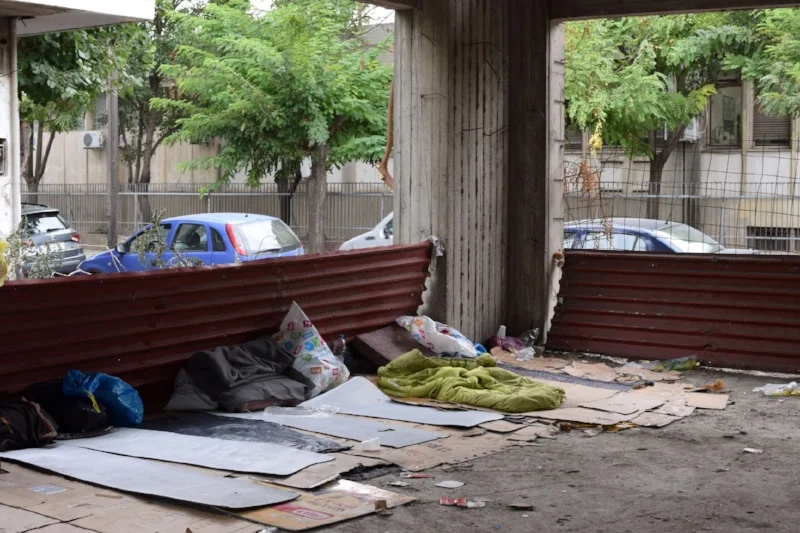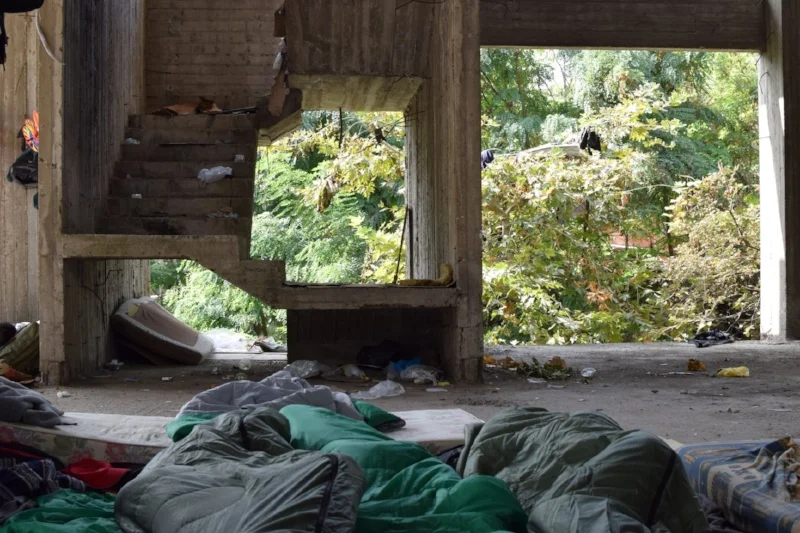The “Abandoned Building”:
A Squat of Refuge in Thessaloniki
“Member States shall ensure that material reception conditions provide an adequate standard of living for applicants, which guarantees their subsistence and protects their physical and mental health.”
Close to the city center of Thessaloniki, an abandoned building has become a place of shelter for many asylum-seeking new arrivals. The multi-storey concrete structure houses as many as two hundred rough sleepers at a time. Exposed to the elements, the squat lacks windows, walls and even a roof in some areas. Without running water or sewage, the building is unsanitary and hazardous in its state of disrepair. Exposed metalwork and long drops between solid patches of flooring on the upper levels make the concrete shell a dangerous place for the men, women and even children who occasionally sleep there. In summer, the unhygienic conditions caused an epidemic of infected mosquito bites and open wounds. In winter, a lack of shelter from the cold weather will make the building almost inhospitable for its tenants. Here you can find statements of some of the inhabitants.
But the dropping temperatures are not the only hardship that the residents must contend with. A regular police presence at the building causes those who sleep there to live in constant uncertainty. The Greek Police have been known to search and investigate the building at various times of the day and night. Incidents reported by the building’s residents to the Mobile Info Team have involved forced removal, the destruction of personal belongings and physical violence by the police.
Life at the building is harsh but unavoidable for these asylum seekers, given the current situation in Greece. The Greek State is currently unable to provide adequate reception facilities to host asylum seekers in a dignified way. This has led to spontaneous, unofficial settlements across the mainland. Without alternative options for accommodation, men arriving in Thessaloniki congregate at the abandoned building in large numbers and rely upon the hospitality of small NGOs to receive food, medical treatment and advice. The Mobile Info Team meets with the building’s residents twice per week at evening food distributions to discuss their experiences and advise them on how to seek asylum and find support services in Thessaloniki. The team has so far met at least four families with small children who have slept for multiple nights at the building during the last two months.
The conditions are poor and, as the climate grows colder, the building will become an even less hospitable place for asylum-seekers to sleep. Many, who arrived in Greece with the intention of seeking asylum, are forced to consider onward movement to other European countries in search of an accessible asylum procedure and dignified living conditions. These individuals will rely on smugglers to help them cross the border, at risk of harm and at great expense. In this way, secondary movements from Greece are fed by the poor reception conditions, from which asylum seekers are motivated to escape. The Mobile Info Team advocates for Greece to provide the asylum-seekers of the abandoned building, and others like them, with accommodation, access to the asylum process and basic support services. Such action is needed to fulfill the state’s human rights obligations and to protect vulnerable asylum-seekers from the dangers of smuggling onward.
We are grateful to anyone who can assist us in shining a light on this issue, to highlight the hardships for those asylum seekers who continue to sleep rough due to a lack of suitable accommodation.






